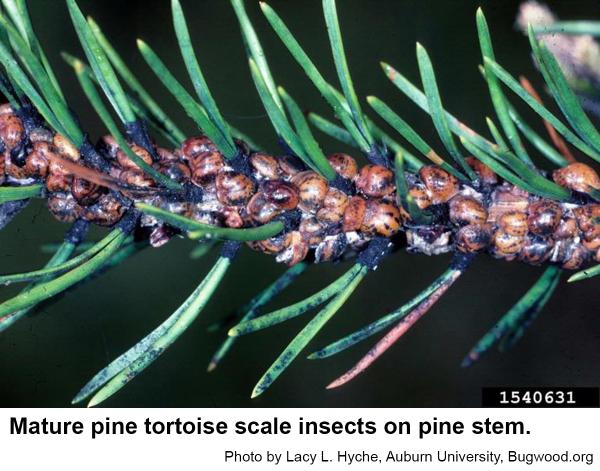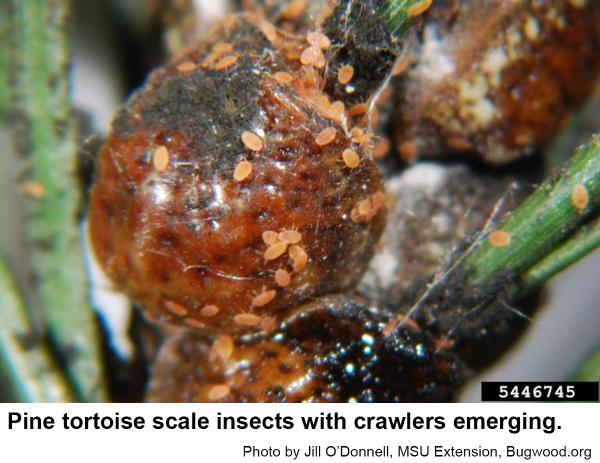Description and Biology
Pine tortoise scale insects, Toumeyella parvicornis, are relatively large soft scales that feed on the newer growth of pines. They are rarely found on larger limbs. Mature females grow to be hemispherical and resemble the shells of miniature tortoises. Pine tortoise scales spend the winter as developing females on pine twigs. Overwintering females are reddish brown and slightly wrinkled. Females resume growth in the spring and mature in April and May. Up to 500 eggs are laid beneath the female's body. Tiny, amber-colored crawlers emerge in late May and June. Crawlers move away from the parent, settle on a twig, and begin forming a white crystalline substance on their bodies. After some weeks, male emerge to mate with new females. Male pine tortoise scales are tiny winged insects that die after mating. Females develop into ¼ inch somewhat flat scales that overwinter on the bark of new growth.
Host Plants
Scots pine and jack pine are the two species most severely attacked by pine tortoise scales in Christmas tree plantations in the northern United States, but red and Austrian pines are also affected there. Apparently most pines can be infested including Virginia pine, Swiss mountain pine, loblolly pine, shortleaf pine, slash pine, Caribbean pine, and Chinese pine. Infested branches often become dark with sooty molds that grow in honeydew excreted by the scales. Growth can be stunted, seed production lowered, commercial value destroyed, and in extreme cases mortality may occur.
Residential Recommendations
On large trees, parasites and predators usually keep pine tortoise scale populations so low that they are usually not a nuisance. Sometimes when insecticides are applied for another pest (such as fogging for mosquitoes or coneworms), parasites and predators of the striped pine scale are killed, but the scales survive and then reproduce unhindered by natural controls. Ants frequently tend pine tortoise scale to obtain honeydew excreted by these insects. It has been suggested that controlling ants may help limited pine tortoise scale populations because ants kill predators of the scales.
Sevin or one of the pyrethroid insecticides marketed in the big box stores should give more than adequate when applied to the crawler stage. If Sevin is used, I recommend using a sprayable formulation. Treat thoroughly after the crawlers have emerged. The crawler stages of Toumeyella scales usually occur in late May. Sometime in early May, it would be a good idea to put a small amount of infested plant material into a clear plastic bag. The bag should be place outdoors in the shade and examined every few days. If the tiny crawlers are noticed crawling about inside the bag or on the needles that would be a very good time to apply Sevin or a pyrethroid. When used as directed, pyrethroids are very toxic to insects but are not particularly hazardous to humans and pets (other than fish-avoid using pyrethroids around pools, ponds, and streams). Insecticidal soaps and horticultural oils may be used in late fall or early spring to treat overwintering females. These compounds will usually not harm beneficial insects. Good coverage is essential.
References
- Pine Tortoise Scale. McKinley, C. 2014. Christmas Tree Notes. NC State University, Cooperative Extension Resources.
- Pine Tortoise Scale (Toumeyella parvicornis). Anonymous. 2007 (update). Christmas Tree IPM Pest Web Page. Dept of Plant Path. Cornell University.
- Toumeyella parvicornis (insect). Pagad, S. 2010. Global Invasive Species Index. Invasive Species Specialist Group (ISSG) of the IUCN Species Survival Commission.
- Extension Plant Pathology Publications and Factsheets
- Horticultural Science Publications
- North Carolina Agricultural Chemicals Manual
For assistance with a specific problem, contact your local N.C. Cooperative Extension Center.
This Factsheet has not been peer reviewed.
Publication date: April 19, 2016
Reviewed/Revised: Oct. 10, 2019
Recommendations for the use of agricultural chemicals are included in this publication as a convenience to the reader. The use of brand names and any mention or listing of commercial products or services in this publication does not imply endorsement by NC State University or N.C. A&T State University nor discrimination against similar products or services not mentioned. Individuals who use agricultural chemicals are responsible for ensuring that the intended use complies with current regulations and conforms to the product label. Be sure to obtain current information about usage regulations and examine a current product label before applying any chemical. For assistance, contact your local N.C. Cooperative Extension county center.
N.C. Cooperative Extension prohibits discrimination and harassment regardless of age, color, disability, family and marital status, gender identity, national origin, political beliefs, race, religion, sex (including pregnancy), sexual orientation and veteran status.


